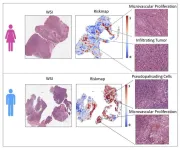(Press-News.org)
AMHERST, Mass. – The National Institutes of Health recently awarded $2.2 million to Alissa Rothchild, assistant professor in the Department of Veterinary and Animal Sciences at the University of Massachusetts Amherst and an expert in tuberculosis (TB) immunology, to study the very first cells that respond to Mycobacterium tuberculosis (Mtb), the bacteria causing TB.
How those initial cells, known as alveolar macrophages, or AMs, respond to the bacteria is not entirely known, though Rothchild and her lab have shown in a previous study that AMs don’t respond to Mtb infection the way other macrophages do. Instead of mounting a strong inflammatory response, AMs turn on a cell-protective program that favors their survival over robust activation. Studies from the Rothchild lab and others have shown that AMs also have the capacity to be reprogrammed to mount a more robust response under different conditions. Rothchild and her colleagues will be spending the next five years trying to do just this.
To understand how Mtb infects the body, it’s useful to first think about immunity. And when we think of immunity, we typically think of the adaptive immune system, which is when prior exposure to a pathogen — either from a previous infection or from vaccination — teaches the immune system what to guard against.
While the adaptive immune system is very effective, it is not the body’s first responder — that is the job of the innate immune system and its ranks of macrophages. Macrophages are the firstline defenders in the tissues that recognize and destroy pathogens and also call for backup. One way they do this is by turning on different inflammatory programs that can change the tissue environment.
In the case of the lungs, the sentinels in the lower airways are the AMs. They sit in the lung’s alveoli, the tiny air sacs where oxygen passes into the bloodstream, constantly sampling the airway contents. But, for reasons unknown, AMs don’t mount a robust immune response when they’re initially infected by Mtb. This lack of response seems to be a chink in the body’s armor that Mtb exploits. “Mtb seems to takes advantage of the immune response,” says Rothchild, “and once AMs are infected, Mtb can replicate inside of these cells for a week or longer before backup arrives. Mtb effectively turns the AM into a Trojan Horse, where the bacteria can hide from the body’s defenses.”
In a previous paper, Rothchild and her colleagues showed that the AMs can be remodeled to mount different responses to Mtb, and that next-generation therapeutics could potentially leverage this plasticity to bring infection under control.
To figure out how to more precisely target the AMs, Rothchild has three aims for her NIH-supported research. First, to understand how AMs sense Mtb. Second, to understand what role interferons, specialized proteins that help host cells respond to pathogens, play in changing the AM response to Mtb. And third, to determine how altering AM responses might affect the host’s response to Mtb infection without disrupting the important homeostatic balance in the lung.
“One of the interesting things about TB,” says Rothchild, “is that during later stages of infection, there is a very robust adaptive host response to the bacteria, but by that point, the host is playing catch-up and struggles to clear the infection without doing too much damage to the lungs. Our hypothesis is that very small, early changes could have huge downstream effects. If we can alter that initial interaction between AM and Mtb, we think we might be able to shift the outcome of the disease.”
This NIH funding comes at the perfect time, because, as Rothchild points out, UMass Amherst has developed a “supergroup” of TB researchers spanning microbiology, immunology, genomics — even computer science. “We meet monthly to share resources, ideas, and initiate joint projects,” says Rothchild. “The support and expertise from the Morita, Siegrist and Green labs here at UMass Amherst have really made it possible for us to move forward with this project.”
It’s going to take just such collaborative work to mount an effective response to tuberculosis, which kills upwards of 1.3 million people a year, making it one of the leading causes of death by an infectious agent worldwide.
Contacts: Alissa Rothchild, arothchild@umass.edu
Daegan Miller, drmiller@umass.edu
END
Imagine a world where your own immune cells are transformed into cancer-fighting superheroes. This is the promise of CAR-T cell therapy, a groundbreaking treatment that’s already saving lives.
In this therapy, patients’ own immune cells are collected, genetically engineered so that they specifically target cancer cells, then returned to the body. The result is a potent new option for battling blood cancers. However, as with any superhero journey, the process of harnessing this incredible power comes with ...
Embargoed for release until 5:00 p.m. ET on Monday 7 October 2024
@Annalsofim
Below please find summaries of new articles that will be published in the next issue of Annals of Internal Medicine. The summaries are not intended to substitute for the full articles as a source of information. This information is under strict embargo and by taking it into possession, media representatives are committing to the terms of the embargo not only on their own behalf, but also on behalf of the organization they represent.
----------------------------
1. First ...
PHILADELPHIA (October 7, 2024) – A new Penn Nursing Center for Health Outcomes and Policy Research (CHOPR) study – published in INQUIRY – has found a strong association between the quality of the nurse work environment and COVID-19 mortality rates among socially vulnerable Medicare beneficiaries. The study examined data from 238 acute care hospitals across New York and Illinois.
The researchers found that patients from socially vulnerable communities, including those facing higher levels of poverty, housing insecurity, and limited transportation, were more likely to die from COVID-19 if they were ...
Key Takeaways:
A new systematic review led by the Harvard Pilgrim Health Care Institute examined a wide body of evidence documenting pediatric mental health outcomes in the period following FDA Black-Box Warnings that antidepressants may be associated with suicidal thoughts and behaviors among youth.
The data indicate that these warnings, meant to increase monitoring of suicidal thoughts and behaviors, resulted in reduced essential medication use and mental health treatment of pediatric depression and increased suicide attempts and deaths.
The findings support a re-evaluation of the Black-Box ...
Embargoed for release: Monday, October 7, 4:00 PM ET
Key points:
Among more than 15,000 SNAP participants across 35 states, food insufficiency increased by 8.4% after pandemic-era Supplemental Nutrition Assistance Program (SNAP) emergency allotments expired. Emergency allotments provided participants up to $250 additional support per month.
Emergency allotment expiration also led to a 2.1% increase in use of food pantries and a 2% increase in difficulty paying expenses, as well as greater anxiety symptoms among Black SNAP participants.
According to the researchers, the findings ...
Most U.S. hospital emergency departments — lacking staffing, training and equipment — are not fully prepared to care for children. Maximizing their readiness to handle pediatric emergencies would be a cost-effective way to save children’s lives, according to a new Stanford Medicine-led study.
The study, which will publish Oct. 7 in Health Affairs, is based on data from hundreds of hospitals in 11 states. About 80% of emergency departments are not highly prepared to treat children, they found. The research team studied whether it would be cost-effective to upgrade these less-prepared emergency departments to make them more ready to treat babies, ...
Lower-income adults with Medicare Advantage plans are more likely to have difficulty paying for dental, vision, and hearing services than higher-income beneficiaries—despite enrolling in plans that cover these benefits, according to a new study published in Health Affairs.
Medicare Advantage plans offer a private insurance alternative to traditional Medicare coverage for health insurance. The most common supplemental benefits are dental, vision, and hearing, with more than 90 percent of Medicare Advantage plans providing coverage for one or more. These supplemental benefits, which are ...
MADISON — For years, cancer researchers have noticed that more men than women get a lethal form of brain cancer called glioblastoma. They’ve also found that these tumors are often more aggressive in men. But pinpointing the characteristics that might help doctors forecast which tumors are likely to grow more quickly has proven elusive. University of Wisconsin–Madison researchers are turning to artificial intelligence to reveal those risk factors and how they differ between the sexes.
Radiology and biomedical engineering professor Pallavi Tiwari and her colleagues have published ...
George Mason Researchers Conducting AI Exploration For Snow Water Equivalent Forecasting In Western U.S. With Physics-Informed Neural Network & GeoWeaver
Ziheng Sun, Research Assistant Professor, Center for Spatial Information Science and Systems (CSISS), Geography and Geoinformation Science, College of Science; Mingrui Liu, Assistant Professor, Computer Science, College of Engineering and Computing (CEC); and Keren Zhou, Assistant Professor, Computer Science, CEC, are studying the dynamics of snow water equivalent (SWE).
SWE measures the amount of water available in snow.
The researchers will use ...
Sarah Huskisson, PhD candidate, Environmental Science and Policy, College of Science, is characterizing the gastrointestinal (GI) health of red pandas using short-chain fatty acid (SCFA) concentrations. Huskisson is advised by Elizabeth Freeman, Associate Professor, School of Integrative Studies. Huskisson is co-Principal Investigator on the project.
Huskisson and Freeman aim to provide the first characterization of SCFA concentrations for red pandas and hope that differences in concentrations can be pinpointed between healthy and mucoid/loose stools.
They have two hypotheses.
First, they hypothesize that ...


